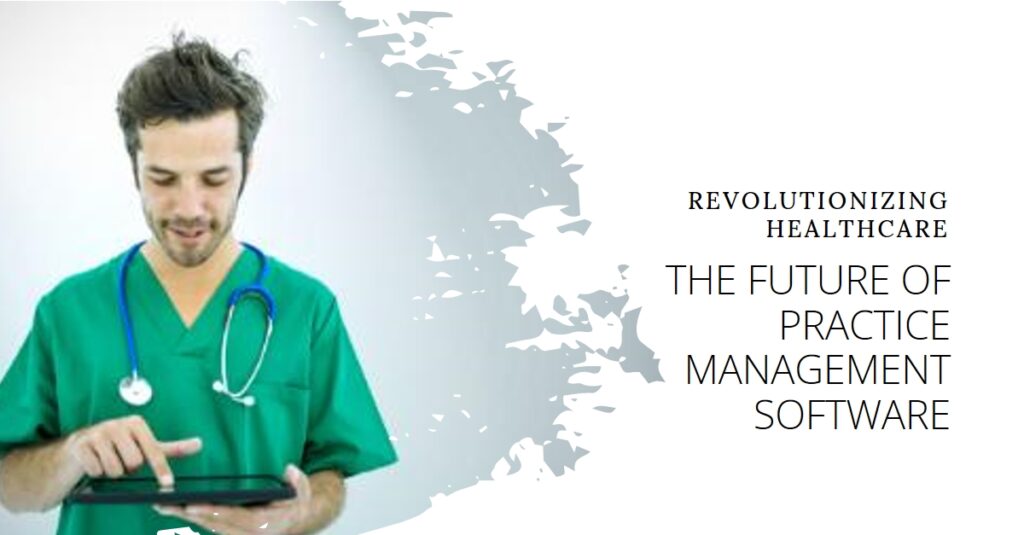As you navigate the ever-evolving landscape of healthcare, one thing remains certain: the future of practice management software holds immense potential. With the juxtaposition of technological advancements and the continuous need for efficient administrative processes, practice management software is poised to revolutionize the way medical practices operate.
But what exactly does this mean for you? Stay tuned as we explore the exciting possibilities that lie ahead, including:
- Artificial intelligence integration: As AI technology continues to advance, it can be seamlessly integrated into practice management software to automate tasks, improve decision-making, and enhance patient care. This integration has the potential to streamline administrative processes, reduce errors, and free up time for healthcare professionals to focus on patient care.
- Enhanced interoperability: Interoperability refers to the ability of different systems and software to exchange and interpret data seamlessly. In the future, practice management software is expected to offer enhanced interoperability, allowing for seamless integration with electronic health records, billing systems, and other healthcare applications. This will improve data sharing, communication between healthcare providers, and overall efficiency in managing patient information.
- The patient engagement revolution: With the rise of patient-centered care, practice management software will play a crucial role in facilitating patient engagement. This includes features such as online appointment scheduling, secure messaging, access to personal health records, and telemedicine capabilities. By empowering patients to take an active role in their healthcare, practice management software can improve patient satisfaction, adherence to treatment plans, and overall outcomes.
The future of practice management software is bright and full of exciting possibilities. By embracing these advancements, healthcare practices can enhance efficiency, improve patient care, and stay at the forefront of an ever-changing industry.
Artificial Intelligence in Practice Management
Artificial intelligence in practice management revolutionizes healthcare operations by automating administrative tasks, optimizing resource allocation, and enhancing patient engagement through personalized interactions. With the advancements in AI technology, practice management systems have become more efficient and effective in managing the dynamics of medical practice.
One of the key benefits of AI in practice management is the automation of administrative tasks. By utilizing natural language processing and machine learning algorithms, AI can handle tasks such as billing and coding, reducing the burden on healthcare professionals and improving accuracy. This automation not only saves time but also ensures that important medical information is properly documented and accessible.
AI also plays a crucial role in optimizing resource allocation. Through predictive analytics and forecasting, AI can analyze data to determine the best allocation of resources, including staff, equipment, and facilities. This helps healthcare organizations streamline their operations, improve efficiency, and provide better care to patients.
Moreover, AI-driven chatbots and virtual assistants are transforming patient engagement. These intelligent systems can provide personalized interactions, answer questions, and offer support, improving communication and satisfaction. Patients can receive timely responses to their queries and feel more connected to their healthcare providers.
In addition, AI-powered data analysis provides valuable insights for performance evaluation and decision-making. By analyzing vast amounts of data, AI can identify patterns, trends, and areas for improvement. This enables healthcare professionals to make informed decisions, enhance practice efficiency, and achieve better outcomes for patients.
Enhanced Interoperability and Integration
With the advancements in practice management software, the integration of Enhanced Interoperability and Integration has revolutionized healthcare operations, creating a seamless communication platform between stakeholders and eliminating manual administrative tasks. This feature allows for the integration of electronic health records and medical billing systems, streamlining workflow and efficiency. By automating tasks like data entry and appointment scheduling, healthcare providers can focus more on delivering quality patient care.
Enhanced Interoperability and Integration in practice management software improve communication between patients, healthcare providers, and staff. This ensures that everyone involved in the patient’s care is on the same page, leading to better coordination and treatment outcomes. It also prevents under- or overbooking appointments, optimizing the use of resources and reducing wait times for patients.
In addition to improving patient care, Enhanced Interoperability and Integration also benefits medical practices by streamlining their operational processes. With all aspects of the practice managed through a single platform, healthcare providers can easily access patient information, schedule appointments, and handle billing and insurance claims. This reduces the chances of errors and improves overall practice efficiency.
Looking into the future, the integration of Enhanced Interoperability and Integration in healthcare software will continue to play a crucial role in the industry chain. It will enable better collaboration between different healthcare organizations, facilitate the sharing of patient information securely, and contribute to the overall improvement of patient care and operational processes in healthcare settings.
Telehealth Integration for Seamless Care
Telehealth integration seamlessly incorporates virtual care delivery into practice management software, revolutionizing the way healthcare services are scheduled, conducted, and patient data is exchanged. With the rapid growth of the telehealth market and the increasing demand for remote patient care, the integration of telehealth within practice management software is shaping the future of the healthcare industry.
By integrating telehealth platforms into practice management software, medical clinics can schedule and conduct virtual appointments, providing patients with convenient access to healthcare services from the comfort of their homes. This not only enhances patient engagement but also improves overall patient care by eliminating the need for in-person visits for routine check-ups or follow-ups.
Furthermore, telehealth integration enables secure and efficient exchange of patient data and medical records during telehealth sessions. This seamless transfer of information ensures that healthcare providers have access to accurate and up-to-date patient records, enabling them to make informed decisions and provide personalized care.
In addition to streamlining patient care, the integration of telehealth within practice management software enhances care coordination. Healthcare providers can easily collaborate and share information, ensuring that patients receive comprehensive and coordinated care across different specialties and healthcare settings.
As the future of the healthcare industry continues to evolve, the seamless integration of telehealth within practice management software will play a crucial role in providing safe, efficient, and patient-centered care. Medical clinics that embrace these management tools and software will be at the forefront of delivering high-quality healthcare services in the digital age.
Patient Engagement Revolution
The patient engagement revolution in healthcare has brought forth the implementation of interactive patient portals and personalized health education. These tools aim to empower patients by providing them with easy access to their medical information, allowing them to actively participate in their own care.
Interactive patient portals enable patients to schedule appointments, view test results, and communicate with healthcare providers. This not only saves time and effort for both patients and providers, but also fosters a sense of autonomy and control over one’s healthcare journey. Patients can conveniently access their medical information whenever they need it, making it easier to stay informed and engaged in their own care.
On the other hand, personalized health education resources play a crucial role in helping patients better understand their conditions and make informed decisions regarding their treatment options. These resources provide tailored information that is specific to each patient’s needs, preferences, and health goals. By presenting information in a clear and accessible manner, patients are empowered to actively participate in their treatment plans and take ownership of their health.
Interactive Patient Portals
Interactive patient portals revolutionize patient engagement in healthcare by providing easy access to personal health records and facilitating e-visits and telehealth services. These portals are an essential component of practice management software, allowing patients to securely access their medical information anytime, anywhere.
Here are four key benefits of interactive patient portals:
- Access to personal health records: Patients can view their lab results, medication lists, and treatment plans, empowering them to actively participate in their healthcare decisions.
- E-visits and telehealth services: Patients can connect with healthcare providers through secure messaging, video consultations, and virtual appointments, reducing the need for in-person visits and improving convenience and accessibility.
- Enhanced patient-provider communication: Patient portals enable secure messaging, allowing patients to ask questions, request prescription refills, and receive timely responses, strengthening the patient-provider relationship.
- Improved patient outcomes: By providing patients with easy access to their health information and enabling virtual care options, interactive patient portals promote patient engagement and empowerment, leading to better healthcare outcomes.
As the healthcare industry continues to evolve, interactive patient portals are becoming increasingly vital in improving patient care and satisfaction.
Personalized Health Education
As healthcare continues to evolve, a key component of practice management software, interactive patient portals, are revolutionizing patient engagement by providing easy access to personal health records and facilitating e-visits and telehealth services.
Now, another crucial aspect of patient engagement, Personalized Health Education (Patient Engagement Revolution), is transforming the way healthcare providers deliver tailored health education materials and resources to individual patients.
This innovative approach allows healthcare providers to deliver personalized information and educational content based on specific health conditions, preferences, and needs. By leveraging technology and patient data, personalized health education enhances patient understanding, compliance, and empowerment.
It promotes health literacy, fosters a collaborative patient-provider relationship, and drives positive behavioral changes in patients.
This shift towards personalized health education is expected to shape the future of patient care and improve health outcomes.
Value-Based Care Models Transforming Practices
Transitioning from a volume-based to a value-based care model empowers practices to prioritize patient outcomes and quality of care. In the future of healthcare, value-based care models are transforming practices and revolutionizing patient care. Here are some key facts to consider:
- Value-based care models incentivize practices to focus on delivering high-quality, cost-effective care that prioritizes patient wellness over the quantity of services provided. It encourages practices to go beyond simply treating illnesses and instead aims to improve overall patient health.
- These models often involve payment structures that reward practices for achieving specific health outcomes and patient satisfaction. By aligning financial incentives with positive patient outcomes, practices are motivated to provide the best care possible.
- Implementing comprehensive population health management strategies becomes crucial for the successful adoption of value-based care models. This involves leveraging data and analytics to optimize patient care, identify high-risk individuals, and allocate resources effectively.
- To achieve positive outcomes, practices must prioritize preventive care, chronic disease management, and patient engagement. By focusing on these areas, practices can work towards improving patient health and reducing healthcare costs in the long run.
As healthcare continues to evolve, the integration of practice management software and revenue cycle management becomes essential for practices to effectively navigate the transition to value-based care models. Practice management systems can streamline administrative tasks, enhance communication between healthcare providers, and improve overall efficiency, ultimately leading to better patient care.
Harnessing the Power of Blockchain Technology
Blockchain technology has the potential to revolutionize healthcare by providing secure data sharing, increased transparency, and streamlined workflows.
With its decentralized and tamper-proof storage capabilities, blockchain ensures the integrity and security of patient records and transactions.
Secure Data Sharing
Secure data sharing in healthcare has been revolutionized through the harnessing of blockchain technology. This innovative technology has paved the way for a more secure and efficient exchange of sensitive medical information. With practice management software (PMS) utilizing blockchain, patient care can greatly benefit. Here are some key advantages:
- Data integrity and security: Blockchain ensures the integrity and security of patient data through cryptographic techniques, making it virtually impossible to tamper with or manipulate.
- Tamper-proof and transparent platform: Blockchain provides a transparent platform for sharing medical information, allowing healthcare providers to access patient records seamlessly while maintaining privacy and consent.
- Increased trust and security: By harnessing blockchain technology in PMS, trust and security in data exchange are significantly enhanced, giving patients peace of mind knowing that their information is safe.
- Efficient sharing across providers: Blockchain enables the seamless sharing of patient records across different healthcare providers, improving collaboration and ultimately enhancing the quality of patient care.
With secure data sharing at the forefront, blockchain technology is shaping the future of healthcare and ensuring the protection of patient information.
Increased Transparency
With the power of blockchain technology, healthcare providers are able to achieve a new level of transparency in recording and managing patient data and transactions.
Blockchain enables secure and tamper-proof recording of medical records, ensuring the integrity and authenticity of the data.
By leveraging blockchain, healthcare entities can create a decentralized system that provides a single source of truth for all involved parties.
This technology can automate and enforce transparent agreements between different healthcare entities through smart contracts.
The immutable ledger of blockchain ensures transparency in tracking the provenance and handling of sensitive medical data.
According to a research report, the Practice Management Software (PMS) market is expected to witness significant growth in the coming years.
Practice management software helps enhance patient care by streamlining administrative tasks, improving communication, and enabling efficient practice operations.
Streamlined Workflows
By harnessing the power of blockchain technology, healthcare providers can streamline their workflows and optimize processes for secure and transparent data management. This innovative technology offers several benefits for practice management software in healthcare:
- Increased efficiency: Blockchain eliminates the need for intermediaries, allowing for direct and automated transactions. This reduces administrative burdens and improves the speed of processes such as billing and coding.
- Enhanced data integrity: Blockchain ensures data accuracy and tamper-proof records, enhancing the trustworthiness of patient information. This promotes patient safety and satisfaction.
- Improved collaboration: Blockchain enables seamless collaboration and data sharing among healthcare stakeholders. This facilitates better communication and coordination, leading to more effective management processes.
- Enhanced security: Blockchain-based solutions provide robust security measures, protecting patient data from unauthorized access and breaches. This ensures data privacy and compliance with regulatory requirements.
Advancements in Clinical Notes Management
Advancements in clinical notes management have revolutionized the way healthcare providers capture, organize, and collaborate on patient information, leading to improved patient care and streamlined workflow management. With the integration of clinical notes management into practice management software, healthcare professionals can now efficiently document and access patient information in a secure and reliable manner.
One of the key benefits of these advancements is the ability to integrate clinical notes management with electronic health records (EHRs). This integration eliminates the need for duplicate data entry and provides a comprehensive view of patient information in one centralized location. This not only saves time but also ensures accuracy and consistency in patient documentation.
Additionally, customizable templates and structured data entry options have improved clinical documentation practices. Healthcare providers can now easily capture relevant information using standardized templates, ensuring compliance with regulations and promoting patient safety. This structured approach also aids in the analysis of patient data for research and quality improvement purposes.
Advanced search and retrieval features further enhance the efficiency of clinical notes management. Healthcare professionals can quickly access relevant patient information and history, enabling them to make informed decisions and provide timely care. The ability to collaborate on clinical notes facilitates comprehensive patient care, as multiple providers can contribute and review notes, ensuring continuity and coordination of care.
As the healthcare industry continues to embrace practice management software with advanced clinical notes management capabilities, patient advocacy and safety will remain at the forefront. These advancements not only improve patient care but also have a positive impact on medical billing and workflow management. With the global market for practice management software expected to grow, healthcare providers can look forward to a future where clinical notes management plays a crucial role in delivering high-quality, patient-centered care.
Conclusion
As you reflect on the future of practice management software in healthcare, you can’t help but be amazed by the transformative power it holds.
With the integration of artificial intelligence, enhanced interoperability, telehealth integration, and patient engagement revolution, the possibilities are endless.
As value-based care models and blockchain technology continue to shape the landscape, practices will become more efficient and patient-centric than ever before.
The advancements in clinical notes management will further streamline processes, ultimately revolutionizing the way healthcare is delivered.
The future is bright, and practice management software is leading the way.




